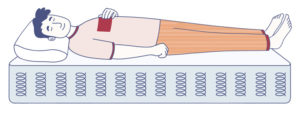For those out there that suffer from both overnight and morning aches and pains, a new mattress could be the solution. A properly-designed mattress can support bad backs and injured joints to prevent pain.
However, it seems like every mattress on the market today is advertised as “orthopedic”- including the ones many out there are currently suffering on. So what is an orthopedic mattress? We’ll answer that question in this article and help you understand if you should be shopping for one.
What Is An Orthopedic Mattress?
An orthopedic mattress is a type of mattress that offers support to the joints. Orthopedic mattresses are typically recommended for people who sleep with pain, people who are in active recovery from injury, seniors, and athletes or other people who are active.
The term “orthopedic mattress” was coined in the 1950s, after studies of how the joints and bones work suggested that specially-designed mattresses could prevent morning back pain.
The first orthopedic mattresses on the market were, indeed, designed following orthopedic principles to be therapeutic for bad backs. However, after mattress manufacturers noticed that these mattresses were selling well, they started calling all mattresses “orthopedic.” After all, there are no government regulations or standards in place to prove that one mattress is better than any other.
There are also no regulations or standards for the language mattress manufacturers can use to describe their products. Essentially, the term “orthopedic mattress” is being used as a marketing term.
RELATED: Best Orthopedic Mattresses
Pros Of Orthopedic Mattresses:
- They provide great support and spine alignment
- They keep you comfortable
- They’re pressure relieving so you won’t have pain build ups in pressure points
Cons Of Orthopedic Mattresses:
- It’s difficult to distinguish a truly orthopedic mattress in the market
- They may be more expensive
How To Find An Orthopedic Mattress
Many mattresses claim to be “orthopedic” but they may not be actually offering the benefits you expect. To find a true orthopedic mattress, it should be pressure-relieving and support proper spine alignment.
Pressure Relief
When lying on a hard surface, the parts of the body in contact with the surface are essentially squashed by the body’s weight. This can cause considerable discomfort and even tissue damage. To avoid pain at the pressure points, the surface of the mattress needs to have some give.
If a mattress is too firm or too soft, you won’t get the pressure-relieving comfort you’re looking for. This means ultra-firm innerspring mattresses or ultra-soft memory foam mattresses may not fit into the orthopedic mattress category.
You shouldn’t discount any single mattress type, though, because you can find some innerspring mattresses and memory foam mattresses that offer incredible pressure relief. Memory foam especially is known to evenly distribute your body weight across the surface for pressure relief. Hybrid mattresses (beds that top a coil support system with memory foam, latex, or other materials) often make a nice sweet spot, providing the balance of support and comfort you need.
Spine Alignment
The other important factor you want to look out for is spine alignment. Similar to mattresses that offer good pressure relief, mattresses that support good spine alignment will also not be too firm or too soft.
The ideal orthopedic mattress will be softer towards the head and foot of the mattress and firmer in the middle. This structure will help support the natural curve of the spine. If you don’t have proper spine alignment, it will place great stress on the muscles, tendons, and even bones of the spine, leading to pain and damage.
Like we said, avoid a mattress that is on one extreme of the mattress firmness scale. If the surface is too soft, the mattress will conform to the natural curves but provide no support at all. If the surface is too firm, you won’t be able to sink in at the right places. Therefore, a properly-designed orthopedic mattress needs to achieve the perfect balance of sufficient softness and sufficient support.
Of course, there are individual differences in how much support is necessary. It is important for each person to try out orthopedic mattresses on an individual basis rather than just accepting a doctor’s prescription for a particular mattress.
Summary
Orthopedic mattresses are simply mattresses that are designed to provide great support to the joints and overall body. Overtime, this term has been overused in the mattress industry, and many mattresses claim to be “orthopedic” without offering the most important qualities for an orthopedic mattress to have.
For a true orthopedic mattress, lookout for a mattress that offers great pressure relief and spine alignment. You can also lookout for certifications and approval from medical experts or organizations like the American Chiropractic Association (ACA).
If you have specific needs for a certain type of mattress, check out some of our specific mattress guides like the ones below:
- Best mattresses for arthritis
- Best mattresses for fibromyalgia
- Best mattress for sciatica
- Best mattresses for back pain
- Best mattresses for hip pain
- Best mattresses for neck and shoulder pain
FAQs
What does an orthopedic mattress do?
An orthopedic mattress provides support for neutral spine alignment and pressure relief. These mattresses are good for supporting the joints to combat or alleviate pain while you sleep.
How long does an orthopedic mattress last?
Orthopedic mattresses are designed with high-quality materials, so they are generally pretty durable and last at least 7-10 years.
Who is an orthopedic mattress good for?
An orthopedic mattress is good for people with pain, people with chronic conditions, people recovering from injuries, seniors, and active people.
Is an orthopedic mattress better than memory foam?
There is no one best mattress type for everyone. In some cases, an orthopedic mattress may be a better fit for you than a memory foam mattress or vice versa. Memory foam mattresses can offer great pressure relief, but an orthopedic mattress may be better for you if you are a heavier person or hot sleeper.


